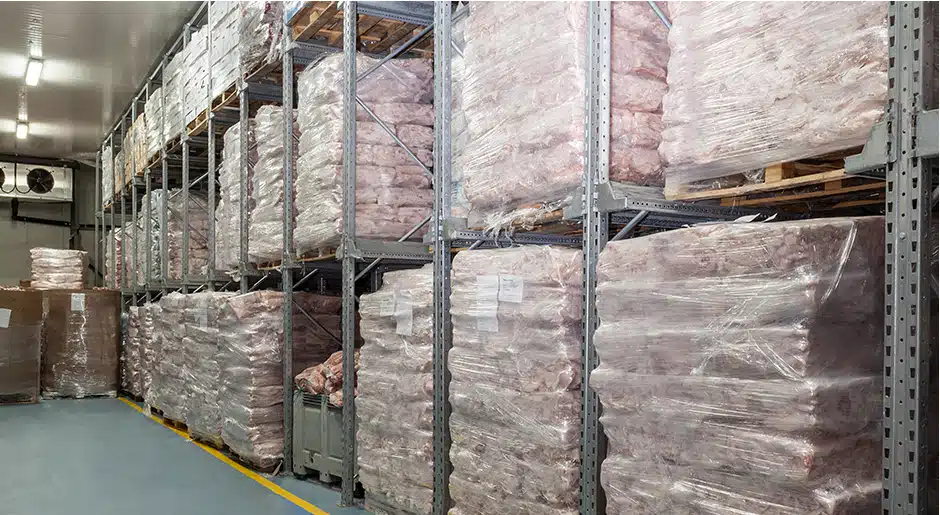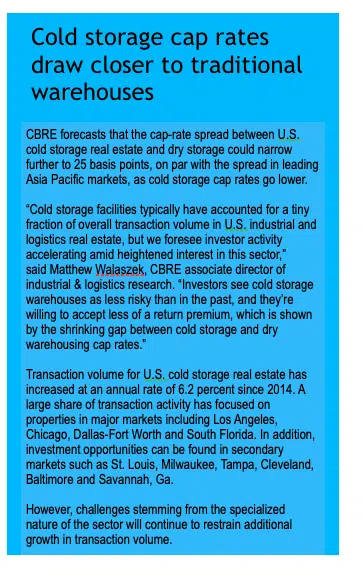Bridge Development Partners and PGIM Real Estate form $150m cold storage JV
Bridge Development Partners and PGIM Real Estate, the global real estate investment management business of Prudential Financial, Inc., have launched a $150 million national cold storage investment program, targeting $400 million in assets. This programmatic joint venture will seek value-add returns through the development of class A cold storage facilities, as well as the acquisition and repositioning of class A/class B cold storage developments across the United States.
As part of the joint venture agreement, Bridge Development Partners has recapitalized its Chicagoland cold storage facility, Bridge Point Northlake, with PGIM Real Estate. The facility will serve as the seed asset for the joint venture’s national cold storage portfolio.
Bridge Development Partners acquired Bridge Point Northlake, a 1.5 million-square-foot former Dominick’s Safeway grocery storage facility, in 2014. Bridge then redeveloped and sold a dry storage building on the property to PGIM Real Estate in 2016 and subsequently redeveloped the remaining two cold storage buildings on the property. The freezer storage facility was expanded by 110,000 square feet and the produce cooler facility — built to suit for candy maker Fannie May in 2017 — was expanded by 61,469 square feet as part of the repositioning.
“Bridge Point Northlake provides both Bridge and PGIM Real Estate with a strong seed asset that will serve as the foundation on which we build our national cold storage portfolio,” said Brian Niven, senior vice president, cold storage at Bridge Development Partners. “This program is paramount as we see populations across the U.S. surging and the demand for fast, fresh product increasing. We’re thrilled to partner with PGIM Real Estate on such a meaningful joint venture, and we look forward to building out this portfolio on a national level.”
Bridge Point Northlake’s freezer features 40-foot clear freezer heights, freezers equipped with minus-10-degree temperatures, a 35-degree refrigerated dock, over 15,000 pallet positions, 78 trailer positions, and 92 parking spots. With 81 percent occupancy, there is 85,000 square feet of cooler space still available.
Bridge Point Northlake is located at the center of the Chicagoland region, just 8.5 miles from O’Hare International Airport and 19 miles from downtown Chicago, with immediate access to Interstates 294 and 290 and in close proximity to Interstates 90, 88 and 355. Though it is located in the O’Hare submarket, it sits at the convergence of three infill markets — O’Hare, Near West, and West — making it ideal for both local and regional users.
E-commerce is warming the cold-storage sector. Driven by the ongoing growth of online grocery sales, the need for cold storage industrial space is skyrocketing. During the first three quarters this year, investors bought $1.9 billion of refrigerated warehouses — up from $1.77 billion for all of 2018 — and higher than any year in the past decade, according to The Wall Street Journal, sourcing data firm Real Capital Analytics.
And in a CBRE report, titled Cold Storage Space: One Size Does Not Fit All, the report cited a projection from the Food Marketing Institute and Nielsen that there could be demand for up to 100 million square feet of industrial real estate space over the next five years, with online grocery ordering expected to account for 13 percent of total grocery sales by 2022, marking a 3 percent gain from 2018. This level of growth, the report explained, would be the equivalent of another $100 billion in annual online grocery sales.
The total amount of space that cold storage properties take up in the industrial space is estimated at 214 million square feet (3.6 billion cubic feet) as of June 2019.
And the biggest players of the space are Lineage Logistics (31.8 percent) and Americold Realty Trust (29 percent), according to the International Association of Refrigerated Warehouses.
In November, Americold Realty Trust entered into a definitive agreement to acquire Nova Cold Logistics based in Canada, for C$337 million ($252 million) from Brookfield Business Partners. And in April, it acquired the privately held Chiller Holdco from Cloverleaf management and an investor group led by private equity funds managed by Blackstone Group for $1.24 billion.
And Lineage Logistics has been expanding globally. It acquired a hedge fund–backed cold chain services provider in a deal reportedly worth an estimated price of $900 million. The firm was Emergent Cold, launched in 2017 by New York City–based Elliot Management Corp. The deal marks Lineage’s entry into the Australia, New Zealand and Sri Lanka markets. And it bought rival Preferred Freezer Services for more than $1 billion earlier this year.
United States Cold Storage, 8.9 percent, and Versacold Logistics, 3.8 percent, make up the top four players, as per the May 2019 ARW North American Top 25 List.
The Wall Street Journal article also included the risks of investing in the sector, specifically the financial cost. To read the full article, click here. The costs per square-foot range from $80 to $120 based on geographic market, with that figure potentially being twice as high out West, where land values are higher, reported CBRE in June.
To read the CBRE’s report, the third and final installment in its Food on Demand series about cold storage, click here.


